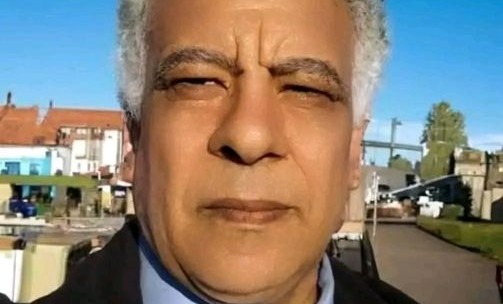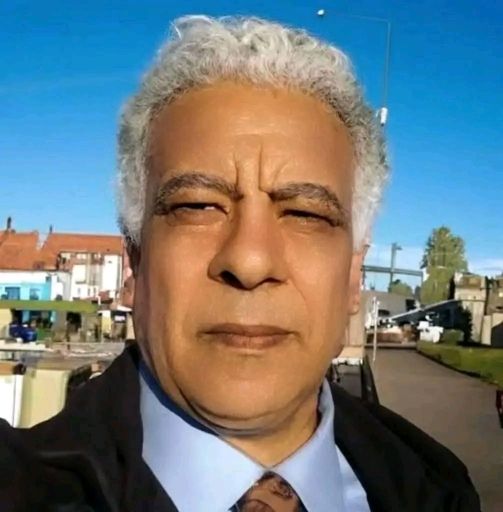ABDEL LATIF MOUBARAK
ABDEL LATIF MOUBARAK — Poeta egiziano della parola profonda
Nato nel 1964 a Suez, Abdel Latif Moubarak è uno dei poeti più significativi della scena letteraria egiziana dagli anni ’80. Scrive in arabo classico e in dialetto egiziano, fondendo tradizione e modernità con una voce lirica e riflessiva.
È laureato in Giurisprudenza presso l’Università Ain Shams e membro attivo dell’Unione degli Scrittori Egiziani e della comunità degli Scrittori Arabi online. Le sue poesie sono apparse in riviste prestigiose come Al-Ahram, Arab Magazine, Kuwait Magazine e Republic Newspaper.
La sua opera è caratterizzata da una profonda sensibilità verso la condizione umana, il dolore sociale, l’amore spirituale e la resistenza poetica. Ha ricevuto numerosi riconoscimenti, tra cui lo Scudo di Eccellenza e Creatività dall’Unione dei Media Arabi nel 2014 e dalla East Academy nel 2021.
Abdel Latif Moubarak è considerato un poeta noto e rispettato nel panorama letterario egiziano e arabo. Ha pubblicato numerose raccolte poetiche.
La sua fama si estende anche oltre i confini dell’Egitto, ed è spesso citato come fonte d’ispirazione per giovani poeti e scrittori del mondo arabo.
Tra le sue raccolte più note:
Feelings and Echoes (1994)
Playing the Roar of Cannons (1996)
Sea Whispers (1997)
A Second Reading of the Body (2001)
A Bout of Thirst (2007)
Experienced Death Again (2016)
Some of Embers (2018)
Nota introduttiva alla poesia, con critica poetica e letteraria
a cura di Francesca Gallelo Gabriel Italo Nel Gòmez
La poesia di Nageh Ahmed è una ferita aperta che pulsa nel silenzio. In Colpo d’amore, la voce poetica non racconta, non descrive: è trafitta. L’amore non è carezza o rifugio, ma scossa elettrica, perdita di controllo, luce tremante in un luogo dove persino le lacrime tremano. L’amato diventa angelo aggressivo, presenza assente, causa di una sete che nessun fiume può colmare. Il linguaggio è sensoriale: il cuore che batte nel sudore, la voce che si spegne nel dolore, gli occhi che non dormono, le città che bruciano nella solitudine. L’amore è anche corpo e voce, una forza che sfinisce ma che il poeta non rinnega, neppure quando lo conduce alla fine. La poesia vive nello spazio tra desiderio e distruzione, nell’urlo del carceriere e nella speranza di essere ancora udito. Ogni verso è un passo verso la redenzione o verso l’oblio, e la poesia diventa allora l’ultimo respiro, l’ultima richiesta: “Vivere un giorno, esprimere il mio amore.” È una preghiera che non chiede pietà, ma memoria.
Nel panorama poetico contemporaneo, la voce di Nageh Ahmed si alza come un canto ferito e irriducibile. Le sue parole non offrono consolazione facile, ma la verità nuda di chi ha conosciuto l’amore, la perdita, l’ingiustizia e la speranza. In questa sua poesia, non c'è retorica: c’è corpo, pianto, sogno e lotta. Farlo conoscere significa accogliere un’anima che scrive per non spegnersi. E in PENNE DAL MONDO, la sua presenza è già parte di noi.
Quando ti circonda il seme
Abdel Latif Moubarak
Egitto
Quando le spighe di grano si allontanano da te,
intreccio le tue lettere per le stelle della sera,
e le tue canzoni si accendono nel giorno dell’incontro,
sul volto del silenzio… una folla di mutismo.
Andate là dove abbiamo cominciato a partire,
i ruscelli portano le minuzie del tempo perduto.
Perdonami la morte, se ti scelgo come rifugio degli umili in protesta,
nella dimora della ferita, alla distanza della stanchezza mortale.
E la tua pazienza andò a chiedere in prestito il giorno del disfacimento da una stella.
In te si rifugia la poesia per non essere umiliata davanti all’alba, e sopra certe pianure stabilisci lingue d’angoscia, nei tuoi tempi in navigazione.
Il sonno spegne la fiamma della solitudine…
le città, e versi nell’occhio le lacrime dell’incontro. Eravamo rami fin dall’inizio, per la terra del distacco, portiamo le sue lettere supplicanti per scrivere d’amore versi per l’amata.
E continui a giurare sul terremoto, per costruire una nuova patria, che le domande hanno smarrito nel suo lamento, e l’impossibile ha chiuso i suoi cancelli con le ondate del tempo che ha iniziato a partire.
Non hai mai lasciato che il raccolto della memoria dicesse che abbiamo placato la sete.
Nel tuo silenzio, le visioni non si espandono oltre i confini del vuoto.
E noi, vani.
ABDEL LATIF MOUBARAK — Egyptian Poet of Profound Language Born in 1964 in Suez, Abdel Latif Moubarak is one of the most significant voices in Egyptian literary circles since the 1980s. He writes in Classical Arabic and Egyptian dialect, blending tradition and modernity with a lyrical and reflective tone. He holds a law degree from Ain Shams University and is an active member of the Egyptian Writers’ Union and the online Arab Writers community. His poems have appeared in renowned magazines such as Al-Ahram, Arab Magazine, Kuwait Magazine, and Republic Newspaper. His work is marked by deep sensitivity toward the human condition, social pain, spiritual love, and poetic resistance. He has received many accolades, including the Shield of Excellence and Creativity from the Arab Media Union in 2014 and from East Academy in 2021. Abdel Latif Moubarak is considered a well-known and respected poet in Egyptian and Arab literature. He has published numerous collections of poetry. His fame also reaches beyond Egypt’s borders and he is often cited as an inspiration for young poets and writers in the Arab world.
His most notable collections include:
· Feelings and Echoes (1994)
· Playing the Roar of Cannons (1996)
· Sea Whispers (1997)
· A Second Reading of the Body (2001)
· A Bout of Thirst (2007)
· Experienced Death Again (2016)
· Some of Embers (2018)
Introductory note to the poem, with poetic and literary analysis
by Francesca Gallello Gabriel Italo Nel Gòmez
The poetry of Nageh Ahmed is an open wound that pulses within silence. In Stroke of Love, the poetic voice does not narrate, does not describe — it is pierced. Love is not a caress or a refuge, but an electric shock, a loss of control, a trembling light in a place where even tears tremble. The beloved becomes an aggressive angel, an absent presence, the cause of a thirst no river can quench. The language is sensorial: the heart beating in sweat, the voice fading into pain, sleepless eyes, cities burning in solitude.
Love is also body and voice — a force that exhausts but that the poet never renounces, not even when it leads him to the end. The poem lives in the space between desire and destruction, in the jailer's scream, in the hope of still being heard. Each verse is a step toward redemption or oblivion. The poem becomes the final breath, the last request: "To live one day, to express my love." It is a prayer that asks not for pity, but for memory.
In the contemporary poetic landscape, Nageh Ahmed's voice rises like a wounded and irreducible song. His words offer no easy comfort, but the naked truth of one who has known love, loss, injustice, and hope. In this poem, there is no rhetoric: there is flesh, weeping, dream, and struggle. To make him known is to welcome a soul that writes to keep from extinguishing.
And in PENNE DAL MONDO, his presence is already part of us.
When the Grain Surrounds You
Abdel Latif Moubarak — Egypt
When the wheat stalks distance themselves from you, I braid your letters for the evening stars, And your songs ignite on the day of meeting, Upon the face of silence… a crowd of muteness.
Go where we began to depart, The streams carry the tiny fragments Of lost time. Forgive me, death, if I choose you As shelter for the humble in protest, Within the dwelling of wounds, At the distance of fatal weariness.
And your patience went to borrow The day of decay from a star. In you, poetry finds refuge So as not to be humiliated before the dawn, And above certain plains you establish Tongues of anguish, Within your sailing times.
Sleep extinguishes the flame of solitude… the cities, And you pour into the eye the tears of reunion. We were branches from the beginning, For the land of separation, We carry its pleading letters To write of love Verses for the beloved.
And you continue to swear upon the earthquake, To build a new homeland, Whose questions were lost in its lament, And the impossible closed its gates With waves of the departing time. You never allowed the harvest of memory To declare our thirst quenched.
Within your silence, visions do not expand Beyond the boundaries of emptiness. And we, Futile.


